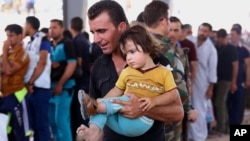STATE DEPARTMENT —
The Obama administration says Syrian-based militants who have seized control of the Iraqi city of Mosul present a broader regional threat that needs a more unified Iraqi government to subdue.
U.S. State Department spokeswoman Jen Psaki says the growing strength in Syria of the al-Qaida-affiliated Islamic State of Iraq and the Levant (ISIL) aided the militants' capture of Mosul.
"We've seen from the situation in Syria and the overflow of the impact of that that there has been a transfer of its recruits, sophisticated munitions and resources to the fight in Iraq. And that has, of course, been of great concern to us," said Psaki.
Psaki says the loss of Iraq's second largest city along with other parts of Nineveh province show a serious deterioration of Iraqi security and a resurgent ISIL threat that benefits from political divisions among Iraqi Sunnis, Shia, and Kurds.
"The threat that ISIL is presenting is not just a threat to Iraq or the stability of Iraq, but it is a threat to the region. And this growing menace exemplifies the importance of Iraqis from all communities working together to confront this common enemy," she said.
Asked about reports that some security forces in Mosul abandoned their posts, Psaki said events there are being closely tracked by officials in Washington and Baghdad as well as in Iraq's semi-autonomous northern Kurdish region.
"In terms of those specific reports, we continue to consult with the government of Iraq on those details. There are a range of Iraqi security forces that remain engaged, and we continue to work with them to address the security situation," she said.
Psaki says the Obama administration has notified Congress of another $1 billion in proposed arms sales to Iraq to include up to 200 Humvees. That's in addition to the 300 Hellfire missiles, small arms and tank ammunition, machine guns, rifles, helicopters and helicopter-fired rockets sent to Baghdad over the past year.
"We are committed to ensuring that ammunition and equipment Iraq needs in its current fight are delivered as quickly as possible," a U.S. Defense Department official told VOA on Tuesday.
The official said the U.S. already had expanded information-sharing initiatives to combat terrorism and has been providing some training to Iraqi troops in Iraq and Jordan.
He said there were no indication any advanced weaponry had fallen into militant hands.
He also said that - per standard procedure - before any advanced weaponry is delivered it undergoes a process to ensure proper security measures are in place to prevent it from falling into enemy hands and being used and to make sure they are not exposed "to the wrong eyes," allowing the enemy to use the equipment to retro engineer anything. He would not explain further.
This is relevant since, as of now, the US is going ahead with the delivery of F16s to Iraq and appears intent on moving ahead with the sale of Apache helicopters.
Jeff Seldin contributed to this report from the Pentagon.
U.S. State Department spokeswoman Jen Psaki says the growing strength in Syria of the al-Qaida-affiliated Islamic State of Iraq and the Levant (ISIL) aided the militants' capture of Mosul.
"We've seen from the situation in Syria and the overflow of the impact of that that there has been a transfer of its recruits, sophisticated munitions and resources to the fight in Iraq. And that has, of course, been of great concern to us," said Psaki.
Psaki says the loss of Iraq's second largest city along with other parts of Nineveh province show a serious deterioration of Iraqi security and a resurgent ISIL threat that benefits from political divisions among Iraqi Sunnis, Shia, and Kurds.
"The threat that ISIL is presenting is not just a threat to Iraq or the stability of Iraq, but it is a threat to the region. And this growing menace exemplifies the importance of Iraqis from all communities working together to confront this common enemy," she said.
Asked about reports that some security forces in Mosul abandoned their posts, Psaki said events there are being closely tracked by officials in Washington and Baghdad as well as in Iraq's semi-autonomous northern Kurdish region.
"In terms of those specific reports, we continue to consult with the government of Iraq on those details. There are a range of Iraqi security forces that remain engaged, and we continue to work with them to address the security situation," she said.
Psaki says the Obama administration has notified Congress of another $1 billion in proposed arms sales to Iraq to include up to 200 Humvees. That's in addition to the 300 Hellfire missiles, small arms and tank ammunition, machine guns, rifles, helicopters and helicopter-fired rockets sent to Baghdad over the past year.
"We are committed to ensuring that ammunition and equipment Iraq needs in its current fight are delivered as quickly as possible," a U.S. Defense Department official told VOA on Tuesday.
The official said the U.S. already had expanded information-sharing initiatives to combat terrorism and has been providing some training to Iraqi troops in Iraq and Jordan.
He said there were no indication any advanced weaponry had fallen into militant hands.
He also said that - per standard procedure - before any advanced weaponry is delivered it undergoes a process to ensure proper security measures are in place to prevent it from falling into enemy hands and being used and to make sure they are not exposed "to the wrong eyes," allowing the enemy to use the equipment to retro engineer anything. He would not explain further.
This is relevant since, as of now, the US is going ahead with the delivery of F16s to Iraq and appears intent on moving ahead with the sale of Apache helicopters.
Jeff Seldin contributed to this report from the Pentagon.

